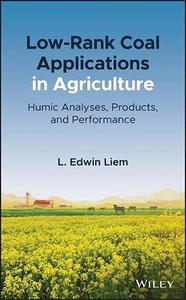
Low-Rank Coal Applications in Agriculture: Humic Analyses, Products, and Performance by L. Edwin Liem
English | PDF | 2021 | 328 Pages | ISBN : 1119734835 | 2.5 MB
Coal is the most abundant type of fossil fuel, accounting for 64% of globally recoverable resources in the world, compared to oil (19%) and natural gas (17%). Coal is traditionally used in the energy sector, generating about 40% of the world's electricity. The demand for coal is expected to increase by over 60% from 2006 to 2030, of which developing countries will account for over 90%.
Coal is the most abundant type of fossil fuel, accounting for 64% of globally recoverable resources in the world, compared to oil (19%) and natural gas (17%). Coal is traditionally used in the energy sector, generating about 40% of the world's electricity. The demand for coal is expected to increase by over 60% from 2006 to 2030, of which developing countries will account for over 90%.
Coal-fired electricity generation is still a major energy source in North America and Australia. In addition, coal is also used in the metallurgical sector, where 70% of the world's steel industry depends on it. The challenge here has been in how to maximize productivity, reduce energy consumption, and drastically reduce carbon dioxide (CO2) emissions (Osborne and Gupta 2013). Efforts have been made to offer a more efficient and cleaner use of coal, including its use in the production of electricity, steel and its associated products, and energy-related chemicals, as well as increasing the use of coal byproducts (Osborne et al. 2013). While significant progress has been made, it is still worth seeking new environmentally friendly and efficient usages of coal beyond these well-known applications. Such usages are not set to immediately replace the existing applications of coal, however, but instead provide alternatives so that whenever the opportunity arises, new market sectors can be generated and expanded as quickly and efficiently as possible.



